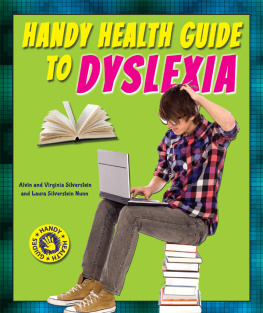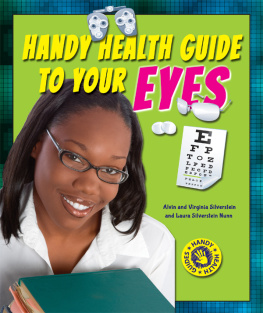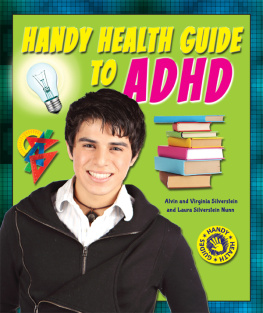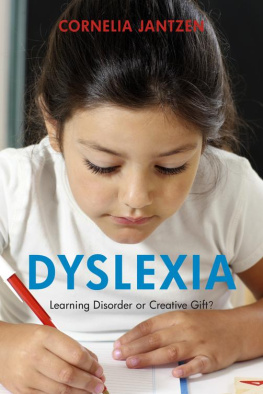TROUBLE READING AND SPELLING?
We all face health problems once in a while. Maybe you have come down with the flu or you have a cavity. Perhaps you have dyslexia or diabetes. Some people need glasses to see better or are allergic to bee stings. These handy guides teach you about your health and how all the parts of your body work together to keep you healthy most of the time.
About the Author
Dr. Alvin Silverstein is a retired professor of biology at the College of Staten Island, City University of New York. Virginia Silverstein translates scientific Russian and is a professional author. Together they have written more than 200 books for young people. Laura Silverstein Nunn has coauthored more than 100 books with her parents.

Image Credit: Shutterstock.com
Everyone gets distracted at times while reading. But sometimes it is a symptom of dyslexia.
Do you have trouble reading? Maybe you are easily distracted and lose your place. Or maybe you have trouble remembering what youve just read. Does your handwriting ever get so sloppy that your teacher cant make out what you wrote? Have you ever misspelled words because you were careless or because you just forgot the correct spelling?
Everybody makes mistakes like these from time to time. Its perfectly normal. Most people can usually catch their errors right away and correct them. But some people may have reading and writing problems like these all the time. Its not because they are lazy or stupid. Its because they have a learning disability called dyslexia. Dyslexia is the most common type of learning disabilitya condition that makes it difficult to learn. Millions of people in the United States have learning disabilities80 to 85 percent of them have dyslexia.
Dyslexia is not just about seeing words and letters backwards. In fact, not all people with dyslexia have a problem with reversing letters and numbers. Dyslexia affects many other areas as well. It is a condition that makes it hard for people to read, write, spell, speak, and listen. Dyslexicspeople who have dyslexiacannot figure out language the way most people do. Their brain has trouble making the connection between the way letters look on a page and the sounds of words. As a result, people with this condition may not be able to understand what words and sentences mean when they try to read.

Image Credit: Shutterstock.com
Even if school seems difficult and frustrating sometimes, dont give up.
Kids with dyslexia can have a very difficult time in school. They may think they are stupid, even though they actually may be very smart. After trying and failing many times, some just give up trying to learn. Some may develop behavior problems, disrupting the class and making it difficult for other kids to learn.

Image Credit: Shutterstock.com
Individual attention can help a person who has trouble learning to read.
Thats why its so important to identify kids who are having reading or learning problems as early as possible. If you or someone you know has dyslexia, there are things that can be done to help. Experts have worked out ways to make learning easier for dyslexics. There are tricks dyslexics can use to train their brains to make sense out of the words they read.
Read on to find out more about dyslexia. Youll find out what causes dyslexia and learn how reading problems can be overcome.

When did you learn your ABCs and 1-2-3s? Most kids learn to read by the first grade. It doesnt just happen overnight. Becoming a good reader is a process that takes timeyears, even. In order to understand dyslexia, it is important to understand what steps are involved in learning how to read:
- Learn how speech sounds make up words.
- Pay attention to printed letters and words.
- Connect speech sounds to letters.
- Combine letter sounds smoothly into words.
- Move the eyes to follow the lines of print.
- Create mental images and ideas.
- Compare new information with what is already known.
- Remember what you read.
Kids with dyslexia have trouble with the first few steps. That makes it even harder to get through the rest of the steps. Not being able to connect words and letters with their sounds makes it impossible for dyslexics to understand what they are reading.

Image Credit: Stockbyte/Photos.com
Dyslexia affects up to 20 percent of the people living in the United States. In fact, there is probably someone in your class at school who has dyslexia. Experts say that it affects 1 out of 5 schoolchildren.
Anyone can have dyslexia. It affects people of all races and all nationalities. Dyslexia is detected more often in boys, but the condition actually affects about the same number of girls. Boys with learning problems tend to misbehave in class so they are identified by teachers more often. Girls with learning problems, on the other hand, tend to keep to themselves and do not attract attention.
Dyslexia is often inherited. People who have dyslexia are born with it. You are more likely to develop dyslexia if one of your parents, grandparents, aunts, uncles, or some other family member has it. Scientists have found that certain genes may make some people more likely to develop the condition. Genes are very small structures that carry traits passed on from parents to children.
Dyslexics may feel stupid when they have problems learning in school, but there is actually no link between dyslexia and intelligence. Many dyslexics are very smart and creative. You might be surprised to know that people with dyslexia have become successful doctors, teachers, writers, lawyers, movie stars, and athletes.
Some of the most important and famous people in history had dyslexia. For example, the scientist Albert Einstein, one of worlds greatest geniuses, had dyslexia. So did Thomas Edison, who invented the electric light, and Alexander Graham Bell, the inventor of the telephone. United States President Woodrow Wilson had dyslexia tooand before he became president, he was a college professor.

No. Kids who have dyslexia do not grow out of it. The problem does not disappear when they become adults. It is a condition they will have to cope with for the rest of their lives. Adults with dyslexia often have trouble dealing with their jobs and people at work.

Image Credit: Shutterstock.com





















